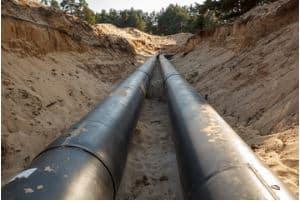Florida Commission Approves Funding for Natural Gas Pipeline Infrastructure Improvements

The Florida Public Service Commission on Nov. 9 authorized continued funding for natural gas pipeline replacement programs, in order to enhance the safety of the state’s energy infrastructure.
Programs that will receive funding in 2024 include:
- Florida Public Utilities Company’s Gas Utility Access and Replacement Directive, or GUARD, program
- Peoples Gas System’s Cast Iron/Bare Steel Pipe Replacement Rider, or Rider, program
- Florida City Gas’ Safety, Access, and Facility Enhancement, or SAFE, program
Florida Public Utilities Company’s first pipeline replacement program, called Gas Reliability and Infrastructure Program, or GRIP, began in 2013 and reached completion in July 2023. The aim of the program was to retrieve the expense of fast-tracked replacement of cast iron and bare steel distribution mains and services. The company moved GRIP’s revenue requirement to rate base, and any remaining amounts will be reflected in the beginning balance of the GUARD program, which is intended to replace problematic pipes and facilities and relocate certain facilities in rear easements and other hard to access areas.
The Rider program, which the commission approved in 2012, allowed Peoples Gas to claim back expenditures for fast tracked replacement and modernization of natural gas pipelines and the surcharges were implemented in January 2013. The SAFE program, approved in 2015, is expected to finish in 2025, and is designed to relocate current gas mains and associated facilities from rear lot easements to the street front, which in turn enhances access and customer service.
Florida is a fast-growing state and its growing resident population has led to increased consumption of transportation fuel. Florida’s population has risen by 18 percent between 2010 and 2022 and is currently estimated to be 22.2 million residents. The state receives most of its fuels via water vessels from U.S. Gulf Coast refiners. Florida has no direct access to the two major pipelines that serve other East Coast states, Colonial and Products (SE). Some parts of the state receive supplies by truck from Colonial Pipeline spurs, which end in southern Georgia. The rest of Florida’s fuels are imports, largely from Europe.
EnerKnol Pulses like this one are powered by the EnerKnol Platform—the first comprehensive database for real-time energy policy tracking. Sign up for a free trial below for access to key regulatory data and deep industry insights across the energy spectrum.
ACCESS FREE TRIAL